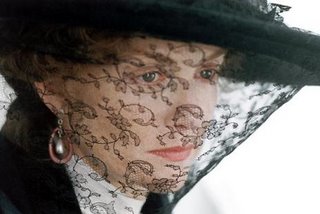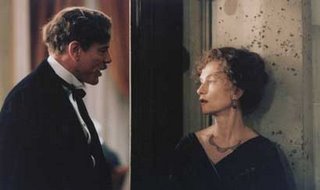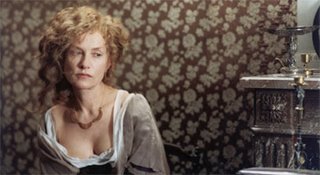Water Drops on Polished Rocks
 So, I have never really cared for the cinema of Patrice Chereau. He's the sort of figure I should love, in theory - Marianne Faithull and Valeria Bruni-Tedeschi, graphic sex, a queer film before Queer cinema existed (at least on a large scale), soundtracks peppered with Tindersticks, Massive Attack, Nina Simone and P. J. Harvey. All of this is music to my ears. And yet, every film leaves me cold. I want to like L'homme Blesse, but I just don't. I could barely make it through Intimacy - and I'm a total sucker for Marianne Faithfull! Every film, that is, except his latest offering, Gabrielle. The film is about as French, mannered and artfully melodramatic as a film can get. A perpetually restrained Isabelle Huppert plays the eponymous character who leaves her painfully respectable husband Jean (Pascal Greggory), only to change her mind and return to find him having already read her letter of adieu. What follows is a game of will bashing and power plays. Though Chereau does not divorce himself from his signature stagnant pacing, the inner conflicts here (as reserved as they certainly are) are supply sufficient tension to find oneself pulled along in the purely dialogue driven narrative.
So, I have never really cared for the cinema of Patrice Chereau. He's the sort of figure I should love, in theory - Marianne Faithull and Valeria Bruni-Tedeschi, graphic sex, a queer film before Queer cinema existed (at least on a large scale), soundtracks peppered with Tindersticks, Massive Attack, Nina Simone and P. J. Harvey. All of this is music to my ears. And yet, every film leaves me cold. I want to like L'homme Blesse, but I just don't. I could barely make it through Intimacy - and I'm a total sucker for Marianne Faithfull! Every film, that is, except his latest offering, Gabrielle. The film is about as French, mannered and artfully melodramatic as a film can get. A perpetually restrained Isabelle Huppert plays the eponymous character who leaves her painfully respectable husband Jean (Pascal Greggory), only to change her mind and return to find him having already read her letter of adieu. What follows is a game of will bashing and power plays. Though Chereau does not divorce himself from his signature stagnant pacing, the inner conflicts here (as reserved as they certainly are) are supply sufficient tension to find oneself pulled along in the purely dialogue driven narrative.
 Though it is my attempt here to celebrate the film, there are certain key bits of historical information which I find necessary to understand before arriving at the conclusion that Gabrielle is an effective work of cinema. Before I attended the screening yesterday afternoon, I read Phillipe Lopate's review in Film Comment where he cited The Earrings of Madame de... as the root of the film's genealogy. So, before heading off to the Sunset 5, I rented an old VHS of Madame de.... It would not be unwarranted to make a double feature, before seeing Gabrielle, of both that film and R.W. Fassbinder's Effie Briest to make clear the strengths of Chereau's film. In both of these previous period melodramas, we find the historical trappings of femininity as preordained in a regimentilly mannered society. Both of our female protagonists are creatures of whimsy, not unlike Ibsen's Nora Helmer (a character which Fassbinder would later visit in a television film), whose frugal carelessness and disregard for societal codes bring about the downfall(either literally or metaphorically) of their spouse. Yet both are also conscious of the hypocrisy of this judgment. Madame's proclivities are not the only factors involved in these situations, yet it is hers which is met with the harshest of reprimands.
Though it is my attempt here to celebrate the film, there are certain key bits of historical information which I find necessary to understand before arriving at the conclusion that Gabrielle is an effective work of cinema. Before I attended the screening yesterday afternoon, I read Phillipe Lopate's review in Film Comment where he cited The Earrings of Madame de... as the root of the film's genealogy. So, before heading off to the Sunset 5, I rented an old VHS of Madame de.... It would not be unwarranted to make a double feature, before seeing Gabrielle, of both that film and R.W. Fassbinder's Effie Briest to make clear the strengths of Chereau's film. In both of these previous period melodramas, we find the historical trappings of femininity as preordained in a regimentilly mannered society. Both of our female protagonists are creatures of whimsy, not unlike Ibsen's Nora Helmer (a character which Fassbinder would later visit in a television film), whose frugal carelessness and disregard for societal codes bring about the downfall(either literally or metaphorically) of their spouse. Yet both are also conscious of the hypocrisy of this judgment. Madame's proclivities are not the only factors involved in these situations, yet it is hers which is met with the harshest of reprimands.
Chereau's film revisits these situations - of the swooning, whimsical female - and endows her with far greater authority than she has previously known. It was not possible for the period female of the fifties(in France, at least) to bear a callous knowledge of her situation, what's more to hold a calculating understanding of her actions. She was still Helmer's "little bird." Even in Fassbinder's film, he uses the absurd frailty of the period female to critique stereotypes perpetually associated with femininity. Chereau, from the very moment the camera lands upon Huppert, dispels that feminine ideal with that of the sternly composed and educated woman. Pas lady. The material associations are there. (There's a brilliant moment where, in reaction to the consequences at hand, Huppert shakes her head, and, in the resilient sound design by Olivier Do Huu, the jangle of her bijoux resound, moments after the action which instigated it.)
 Of course, this is the could be expanded to include the film at large. The consequences of Huppert's action never mend themselves - tearing their world apart. There are a great many formal devices deployed in Gabrielle, most of them superfluous. I understand what Chereau is getting at with his catastrophic music and it frequently works - though when it doesn't it is rather crippling. The stock switches from color to black and white sans purpose. There are some dreadful intertitles which do little but refute the poignancy of filmic adaptation (Gabrielle is based on Joseph Conrad's The Return). Chereau's now-regular cameraman, Eric Gautier, however graces every moment with the glowing consideration given to a Danish still life or Spanish portrait. In the first of the two party sequences, his exhilarating, drunken camerawork visually parallels the dizzying social scene which hums with a beautiful composure. Huppert knows her place in French cinema and wields this knowledge with great aptitude. No one has greater facial control than she. Maudlin moments are heightened by her ability to control every facial muscle imaginable. Greggory's self-important Jean requires precious little of him, but just enough to expose his charisma as an actor. And as a meditation on the masculine gaze (which is literally discussed at one point) the film is truly dire. Though to some, I could see it being a dirge. I guess I would say, without a greater knowledge of historical melodrama, proceed with caution.
Of course, this is the could be expanded to include the film at large. The consequences of Huppert's action never mend themselves - tearing their world apart. There are a great many formal devices deployed in Gabrielle, most of them superfluous. I understand what Chereau is getting at with his catastrophic music and it frequently works - though when it doesn't it is rather crippling. The stock switches from color to black and white sans purpose. There are some dreadful intertitles which do little but refute the poignancy of filmic adaptation (Gabrielle is based on Joseph Conrad's The Return). Chereau's now-regular cameraman, Eric Gautier, however graces every moment with the glowing consideration given to a Danish still life or Spanish portrait. In the first of the two party sequences, his exhilarating, drunken camerawork visually parallels the dizzying social scene which hums with a beautiful composure. Huppert knows her place in French cinema and wields this knowledge with great aptitude. No one has greater facial control than she. Maudlin moments are heightened by her ability to control every facial muscle imaginable. Greggory's self-important Jean requires precious little of him, but just enough to expose his charisma as an actor. And as a meditation on the masculine gaze (which is literally discussed at one point) the film is truly dire. Though to some, I could see it being a dirge. I guess I would say, without a greater knowledge of historical melodrama, proceed with caution.

1 Comments:
i fucking love isabelle huppert
Post a Comment
<< Home